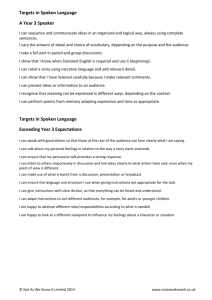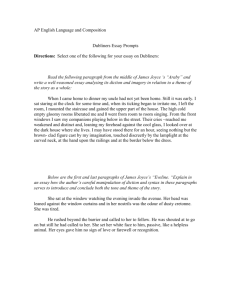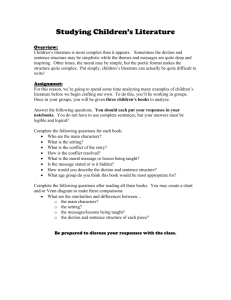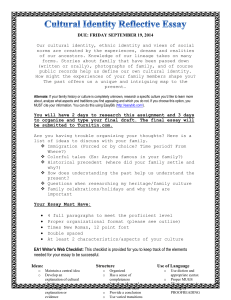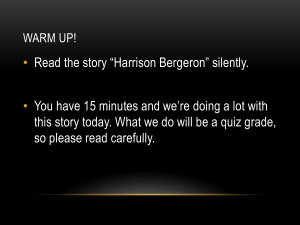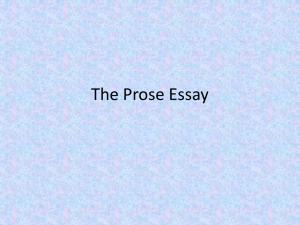Lesson plan 4
advertisement
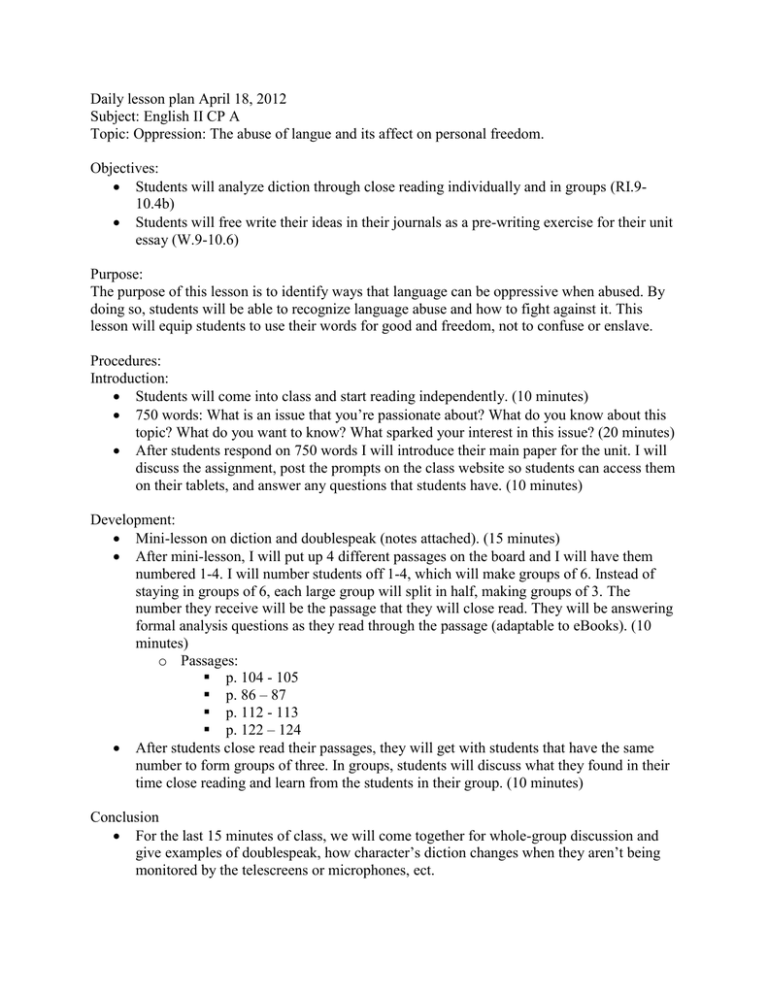
Daily lesson plan April 18, 2012 Subject: English II CP A Topic: Oppression: The abuse of langue and its affect on personal freedom. Objectives: Students will analyze diction through close reading individually and in groups (RI.910.4b) Students will free write their ideas in their journals as a pre-writing exercise for their unit essay (W.9-10.6) Purpose: The purpose of this lesson is to identify ways that language can be oppressive when abused. By doing so, students will be able to recognize language abuse and how to fight against it. This lesson will equip students to use their words for good and freedom, not to confuse or enslave. Procedures: Introduction: Students will come into class and start reading independently. (10 minutes) 750 words: What is an issue that you’re passionate about? What do you know about this topic? What do you want to know? What sparked your interest in this issue? (20 minutes) After students respond on 750 words I will introduce their main paper for the unit. I will discuss the assignment, post the prompts on the class website so students can access them on their tablets, and answer any questions that students have. (10 minutes) Development: Mini-lesson on diction and doublespeak (notes attached). (15 minutes) After mini-lesson, I will put up 4 different passages on the board and I will have them numbered 1-4. I will number students off 1-4, which will make groups of 6. Instead of staying in groups of 6, each large group will split in half, making groups of 3. The number they receive will be the passage that they will close read. They will be answering formal analysis questions as they read through the passage (adaptable to eBooks). (10 minutes) o Passages: p. 104 - 105 p. 86 – 87 p. 112 - 113 p. 122 – 124 After students close read their passages, they will get with students that have the same number to form groups of three. In groups, students will discuss what they found in their time close reading and learn from the students in their group. (10 minutes) Conclusion For the last 15 minutes of class, we will come together for whole-group discussion and give examples of doublespeak, how character’s diction changes when they aren’t being monitored by the telescreens or microphones, ect. Materials Feed, 1984 Journal Paper prompts Dry erase board and markers Writing utensils Evaluation: Introduction — the journal will be counted as a pre-writing activity, which will be included in their overall essay grade. It will also be worth .5 points for their daily participation grade Development — I will walk around while students are participating in group work to gage where they are, how they’re doing, and what they need help with. Conclusion — Students will turn in their close reading handouts at the end of class to count for the second .5 points in their daily participation. Diction Close Reading Guide Name: _____________________________________ 1. What type of diction is used in this passage (high, medium, low)? Does this change at all, or stay the same? What words and phrases revealed this to you? 2. Are there any examples of doublespeak? If so, what are they? 3. If there are examples of doublespeak, how could you rewrite the sentences to make the meaning more clear? 4. What is the setting of your passage? Is it under heavy surveillance by Big Brother, or are characters free from governmental watch? How does this affect word choice? 5. Did you have a hard time understanding any of the language or any of the diction? What was the context of this language use? Persuasive Research Essay Description: Each of you have written a journal entry about something that you care about. In your journals you wrote everything down that you know about this subject, everything that you want to know, and what got you interested in this topic. You will be using your journal as a starting point to write a persuasive essay about this issue. Your job in this essay will be to persuade your audience to feel the same way that you do about the topic. You will need to develop one arguable thesis. Your entire essay should support this thesis (50 points). For example: “The most ethical and sustainable diet is a vegetarian diet.” I can support this and it can also be countered. When you are writing this paper, you need to include research. Persuasive essays are most effective when the author has a command on the material that they are discussing. You will need to include: 1. One source that supports your opinion (10 points) 2. One source that opposes your opinion (10 points) 3. An interview with someone that has knowledge on this subject (10 points) Your essay must be at the minimum, 3 pages. (10 points) You must follow MLA format. (5 points) Paper should be free of careless errors. If you use a sentence fragment stylistically, please indicate where this occurs. This way, I will know that you know you are using sentence fragments. (5 points) ***You may choose to create a blog on your research findings. If you choose to do this, each component of your paper should constitute a separate blog entry. Due date: Tuesday, April 24 Diction mini-lesson (http://laurabernhard.edublogs.org/files/2010/08/Diction-Mini-Lesson1bz2yf1.pptx) What is diction: choice of words that the author uses. Levels of diction: High (Formal) — Academic writing, a president’s speech Medium (Informal) — A news article, persuasive essay Low (Colloquial) — Writing on a friend’s Facebook, texting, writing your best friend a letter Can you think of examples for each? Examples: High: “That we are in the midst of crisis is now well understood. Our nation is at war, against a far-reaching network of violence and hatred. Our economy is badly weakened, a consequence of greed and irresponsibility on the part of some, but also our collective failure to make hard choices and prepare the nation for a new age. Homes have been lost; jobs shed; businesses shuttered. Our health care is too costly; our schools fail too many; and each day brings further evidence that the ways we use energy strengthen our adversaries and threaten our planet.” President Barack Obama (Inaugural Address, 2009) Medium: “This recipe is inspired by potato skins! It is really versatile and can be done in several different ways. For the cream you can use any kind of nut, or even your own nut yogurt! If you don’t like fennel, you can try substituting with onion. You can also actually use potatoes/ sweet potatoes and bake them as you would for regular potato skins, then top it off with the raw toppings. Another idea I had was making avocado “skins”. Since avocado is naturally creamy, I would even omit the extra nut cream and just use the mushroom/ fennel topping.” (Veggiewedgie, Recipe) What is doublespeak? It is the abuse of language through the following ways: 1. Euphemisms 2. Jargon: used to confuse nonmembers 3. Bureaucratese: complication to overwhelm audiences 4. Inflated language: saying things fancy instead of simply Orwell’s rules against doublespeak: 1. Don’t use figures of speech that are common — find a new way to say what you mean because meanings of these sayings are often lost on individuals. 2. Never use a long word where a short word will do. 3. If you can cut a word out, cut it out 4. If possible, always use the active voice 5. Never use foreign phrases or jargon when you can think of everyday equivalents 6. Break any of these rules sooner than say something “barbarous”— keep these rules in mind, but if something sounds better or is more effective a certain way, don’t worry about these rules.
